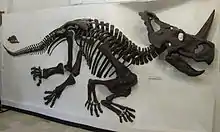Ceratopsidae
Ceratopsidae (sometimes spelled Ceratopidae) is a family of dinosaurs including Triceratops, Torosaurus, and Styracosaurus. All known species were quadrupedal herbivores from the Upper Cretaceous, mainly of Western North America (though Sinoceratops is known from Asia[1] as well as possible fossils in Japan, and Kazakhstan) and are characterized by beaks and elaborate horns and frills. The group is divided into two subfamilies (see Taxobox).
| Ceratopsids | |
|---|---|
 | |
| Triceratops prorsus skeleton, Natural History Museum of Los Angeles County. | |
 | |
| Centrosaurus "nasicornus" skeleton, Palaeontological Museum Munich | |
| Scientific classification | |
| Kingdom: | Animalia |
| Phylum: | Chordata |
| Clade: | Dinosauria |
| Order: | †Ornithischia |
| Parvorder: | †Coronosauria |
| Superfamily: | †Ceratopsoidea |
| Family: | †Ceratopsidae Marsh, 1888 |
| Subgroups | |
| |
| Synonyms | |
| |
References
- Xu, X.; Wang, K.; Zhao, X. & Li, D. (2010). "First ceratopsid dinosaur from China and its biogeographical implications". Chinese Science Bulletin. 55 (16): 1631–1635. doi:10.1007/s11434-009-3614-5. S2CID 128972108.
Other websites
 Media related to Ceratopsidae at Wikimedia Commons
Media related to Ceratopsidae at Wikimedia Commons Data related to Ceratopsidae at Wikispecies
Data related to Ceratopsidae at Wikispecies
This article is issued from Wikipedia. The text is licensed under Creative Commons - Attribution - Sharealike. Additional terms may apply for the media files.